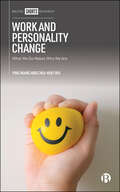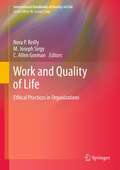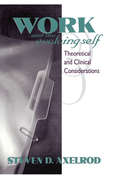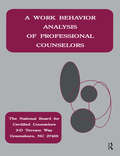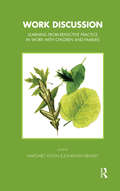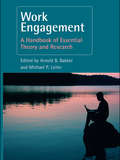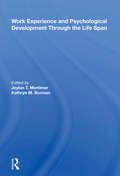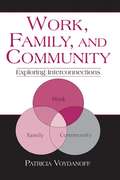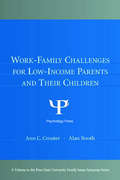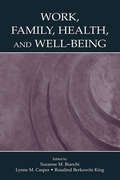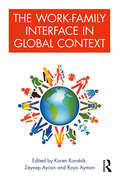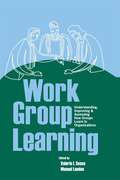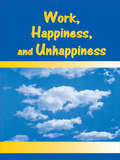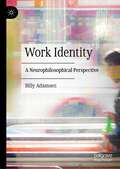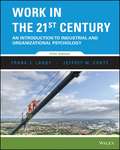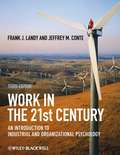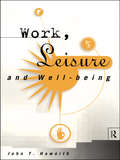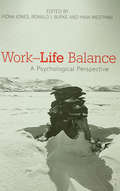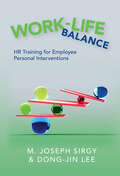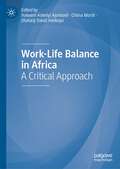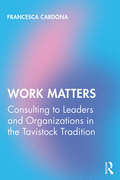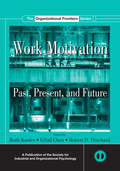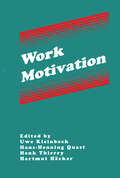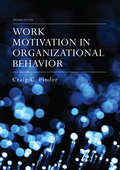- Table View
- List View
Work and Personality Change: What We Do Makes Who We Are
by Ying Wang Chia-Huei WuCan your job change your personality? While traditionally personality has been considered fixed and stable, recent thinking indicates that this is not the case. Personality can be changed by various work and vocational experiences, such as employment conditions, career roles, job characteristics and training or interventions. Drawing on a wide array of research in the field, Wang and Wu provide a conceptual overview on how personality can be changed at work by societal, organisational and job-related factors, while considering how individuals can take an active approach in changing their personality at work.
Work and Quality of Life
by C. Allen Gorman Nora P. Reilly M. Joseph SirgyEmployees have personal responsibilities as well as responsibilities to their employers. They also have rights. In order to maintain their well-being, employees need opportunities to resolve conflicting obligations. Employees are often torn between the ethical obligations to fulfill both their work and non-work roles, to respect and be respected by their employers and coworkers, to be responsible to the organization while the organization is reciprocally responsible to them, to be afforded some degree of autonomy at work while attending to collaborative goals, to work within a climate of mutual employee-management trust, and to voice opinions about work policies, processes and conditions without fear of retribution. Humanistic organizations can recognize conflicts created by the work environment and provide opportunities to resolve or minimize them. This handbook empirically documents the dilemmas that result from responsibility-based conflicts. The book is organized by sources of dilemmas that fall into three major categories: individual, organizational (internal policies and procedures), and cultural (social forces external to the organization), including an introduction and a final integration of the many ways in which organizations can contribute to positive employee health and well-being. This book is aimed at both academicians and practitioners who are interested in how interventions that stem from industrial and organizational psychology may address ethical dilemmas commonly faced by employees.
Work and the Evolving Self: Theoretical and Clinical Considerations
by Steven D AxelrodIn Work and the Evolving Self, Steven Axelrod begins to remedy this serious oversight by setting forth a comprehensive psychoanalytic perspective on work life. Consonant with his analytic perspective, Axelrod sets out to illuminate the workplace by examining the psychodynamic meaning of work throughout the life cycle. He begins by exploring the various dimensions of work satisfaction from a psychoanalytic perspective and then expands on the relationship between work life and the adult developmental process. This developmental perspective frames Axelrod's central task: an examination of the typical work-related problems encountered in clinical practice, beginning with a psychodynamic definition of a "work disturbance." Moving on to treatment issues, Axelrod elaborates on the manner in which assessment, supportive, and exploratory interventions all enter into the treatment of work disturbances. Axelrod concludes by considering issues of career development that emerge in individual psychotherapy and exploring the psychological implications of dramatic changes now taking place in the workplace. As such, Work and the Evolving Self is an impressive contribution to the task with which psychoanalytic therapists are increasingly engaged: that of broadening their identities and treatment approaches in a world that increasingly demands flexibility and innovation.
Work and the Mental Health Crisis in Britain
by Carl Walker Ben FinchamBased on recent data gathered from employees and managers, Work and the Mental Health Crisis in Britain challenges the cultural maxim that work benefits people with mental health difficulties, and illustrates how particular cultures and perceptions can contribute to a crisis of mental well-being at work. <P><P> Based on totally new data gathered from employees and managers in the UK Presents a challenge to much of the conventional wisdom surrounding work and mental health Questions the fundamental and largely accepted cultural maxim that work is unquestionably good for people with mental health difficulties Illustrates how particular cultures of work or perceptions of the experience of work contribute to a crisis of mental well-being at work Fills a need for an up-to-date, detailed work that explores the ways that mental health and work experiences are constructed, negotiated, constrained and at times, marginalised Written in a style that is detailed and informative for academics and professionals who work in the mental health sphere, but also accessible to interested lay readers
A Work Behavior Analysis Of Professional Counselors
by National Board for Certified Counselors Larry C. Loesch Nicholas A. VaccThis study was conceived in the winter of 1984, in response to the profession’s efforts to achieve counselor licensure. Licensure of counselors brought about the concern of what defines the practice of a professional counselor. The study had its origins in two sources: (a) the National Board for Certified Counselors’ and staff members’ functioning and (b) a commitment by NBCC to strengthen the credentialing of counselors and incur the expense to conduct a study of this magnitude.
Work Discussion: Learning from Reflective Practice in Work with Children and Families (Tavistock Clinic Series)
by Jonathan Bradley Margeret RustinThis book provides the history, theory, and practice of work discussion as developed at the Tavistock Clinic. It describes the evolution and contemporary practice of work discussion in relation to a wide range of professional work with children, adolescents, and families.
Work Engagement: A Handbook of Essential Theory and Research
by Arnold B. BakkerThis book provides the most thorough view available on this new and intriguing dimension of workplace psychology, which is the basis of fulfilling, productive work. The book begins by defining work engagement, which has been described as ‘an opposite to burnout,’ following its development into a more complex concept with far reaching implications for work-life. The chapters discuss the sources of work engagement, emphasizing the importance of leadership, organizational structures, and human resource management as factors that may operate to either enhance or inhibit employee’s experience of work. The book considers the implications of work engagement for both the individual employee and the organization as a whole. To address readers’ practical questions, the book provides in-depth coverage of interventions that can enhance employees’ work engagement and improve management techniques. Based upon the most up-to-date research by the foremost experts in the world, this volume brings together the best knowledge available on work engagement, and will be of great use to academic researchers, upper level students of work and organizational psychology as well as management consultants.
Work Experience And Psychological Development Through The Life Span
by Jeylan T MortimerThroughout the modern era, scholars have shown a continuing concern with the extent to which position in the occupational structure affects psychological development. This book examines whether work experiences and age (often considered as a proxy for stage in the work career) interact such that the effects of occupational conditions on the person
Work, Family, and Community: Exploring Interconnections (Applied Psychology Series)
by Patricia VoydanoffResearch in recent decades has proven that the seemingly disparate worlds of family life and the workplace are in fact closely intertwined. Moreover, scholars have begun to recognize the extent to which community life influences the work-family interface, for instance, the lack of fit between school hours and work hours, and assistance provided by community-based child care services. Work, Family, and Community is the first to provide a comprehensive review and analysis of the theoretical and empirical research that has examined the complex interconnections among these domains. This book integrates literature from several disciplines, including sociology, industrial-organizational and occupational health psychology, human development and family studies, management, gender studies, and social work. It documents significant patterns and trends in the economy and looks at the health of communities and neighborhoods, exploring the level of social integration, availability of community services, and the extent to which such services meet the needs of working families. Author Patricia Voydanoff takes an important step in conceptualizing the components and processes that comprise the work-family-community relationship, and provides direction for future theoretical and empirical work on the topic. This volume speaks to scholars, researchers, and students who address the theoretical, empirical, and policy-relevant issues associated with the work-family-community interface.
Work-Family Challenges for Low-Income Parents and Their Children (Penn State University Family Issues Symposia)
by Ann C. Crouter Alan BoothThe area of work and family is a hot topic in the social sciences and appeals to scholars in a wide range of disciplines. There are few edited volumes in this area, however, and this may be the only one that focuses on low-income families--a particularly important group in this era of welfare-to-work policy. Interdisciplinary in nature, the volume brings together contributors from the fields of psychology, social work, sociology, demography, economics, human development and family studies, and public policy. It presents important work-family topics from the point of view of low-income families at a time in history when welfare to work programs have become standard. Divided into four parts, each section addresses a different aspect of the topic, consisting of a big picture lead essay which is followed by three papers that critique, extend, and supplement the final paper. Many of the chapters address important social policy issues, giving the volume an applied focus which will make it of interest to many groups. Serving to organize the volume, these issues and others have been encapsulated into four sets of anchor questions: *How has the availability, content, and stability of the jobs available for the working poor changed in recent decades? How do work circumstances for low-income families vary as a function of gender, family structure, race, ethnicity, and geography? What implications do these changes have for the widening inequality between the haves and have-nots? *What features of work timing matter for families? What do we know about the impacts of shift work, long hours, seasonal work, and temporary work on employees, their family relationships, and their children's development? *How are the child care needs of low-income families being met? What challenges do these families face with regard to child care, and how can child-care services be strengthened to support parents and to enhance child development? *How are the challenges of managing work and family experienced by low-income men and women? The primary audience for the book is academicians and their students, policy specialists, and people charged with developing and evaluating family-focused programs. The volume will be appropriate for classroom use in upper-level undergraduate courses and graduate courses in the fields of family sociology, demography, human development and family studies, women's studies, labor studies, and social work.
Work, Family, Health, and Well-Being
by Suzanne M. Bianchi Lynne M. Casper Rosalind Berkowitz KingWork, Family, Health, and Well-Being grew out of a conference held in Washington, D.C. in June 2003 on "Workforce/Workplace Mismatch: Work, Family, Health, and Well-Being" sponsored by the National Institutes of Health (NIH). The text considers multiple dimensions of health and well-being for workers and their families, children, and communities. Investigations into the socioeconomic gradient in health within broad occupational categories have raised important questions about the role of specific working conditions versus the role of conditions of employment such as wages and level of job security afforded a worker and his/her family in affecting health outcomes.Organized into seven parts, this text:*provides an overview of changes in work and family time and time use;*dedicates a section focusing specifically on employers and workplaces;*explores disciplinary perspectives on work, family, health, and well-being;*focuses on the most studied work and family nexus, the interrelationship between parental employment, especially maternal employment and the child's well-being;*examines gender differences in the division of labor, the effect of marriage on health, the shifting nature of care-giving throughout life, and the role of work on various health and well-being outcomes;*explores occupational health literature; and*focuses on the unique work-family issues faced by low-income families and workers in low-wage jobs.This book appeals to anyone in the fields of psychology, sociology, family studies, demographics, economics, anthropology, and social work.
The Work-Family Interface in Global Context
by Karen Korabik Zeynep Aycan Roya AymanBased on a sweeping, ten country study, The Work-Family Interface in Global Context comprises the most comprehensive and rigorous cross-cultural study of the work-family interface to date. Just as work-family conflict is associated with negative consequences for workers, organizations, and societies, so too can the work and family domains interact positively to enhance or enrich one another. Drawing on qualitative, quantitative, and policy-based data, chapters in this collection explore the influence of culture on the work-family interface in order to help researchers and managers understand the applicability of work-family models in a variety of contexts and further conceptualize work-family interactions through the development of a more universal knowledge. Members of the Project 3535 Team: Karen Korabik, University of Guelph, Canada.Zeynep Aycan, Koç University, Turkey.Roya Ayman, Illinois Institute of Technology, USA.Artiawati, University of Surabaya, Indonesia.Anne Bardoel, Monash University, Australia.Anat Drach-Zahavy, University of Haifa, Israel.Leslie B. Hammer, Portland State University, USA.Ting-Pang Huang, Soochow University, Taiwan.Donna S. Lero, University of Guelph, Canada.Tripti Pande-Desai, New Delhi Institute of Management, India.Steven Poelmans, EADA Business School, Spain.Ujvala Rajadhyaksha, Governors State University, USA.Anit Somech, University of Haifa, Israel.Li Zhang, Harbin Institute of Technology, China.
Work Group Learning: Understanding, Improving and Assessing How Groups Learn in Organizations
by Valerie Sessa Manuel LondonThis contributed book shapes the emerging field of group learning by drawing on research from leading theoreticians and researchers. Author contributions aggregate existing theory and research and go beyond this foundation to examine new insights about how groups learn and what they learn, factors that influence group learning, learning interventio
Work, Happiness, and Unhappiness
by Peter WarrAward-winning psychologist Peter Warr explores why some people at work are happier or unhappier than others. He evaluates different approaches to the definition and assessment of happiness, and combines environmental and person-based themes to explain differences in people’s experience. A framework of key job characteristics is linked to an account of primary mental processes, and those are set within a summary of demographic, cultural, and occupational patterns. Consequences of happiness or unhappiness for individuals and groups are also reviewed, as is recent literature on unemployment and retirement. Although primarily focusing on job situations, the book shows that processes of happiness are similar across settings of all kinds. It provides a uniquely comprehensive assessment of research published across the world. Initial chapters explore the several meanings of happiness and the ways in which those have been measured by psychologists. The construct includes pleasure, satisfaction and subjective well-being, and unhappiness has been studied in terms of dissatisfaction, strain, anxiety, and depression. The impacts of principal environmental features on these experiences are reviewed through an analogy with vitamins in relation to physical health—beneficial only up to a point. However, environmental effects are not fixed. Influences on happiness from within the person are examined in terms of principal thinking patterns, personality styles, and cultural backgrounds. Differences are explored between groups (men and women, older and younger people, employees who are full-time and part-time, and so on), and processes of person-environment fit are placed within an overall framework which emphasizes the impact of variations in personal salience. The book is written primarily for academic readers, including senior undergraduates, graduate students, teachers, and researchers in fields of Industrial/Organizational Psychology, Management, Human Resources, and Labor Studies. However, the topic's centrality in many professions makes it important also to a wider readership.
Work Identity: A Neurophilosophical Perspective
by Billy AdamsenAt present, 80% of the employees are no longer engaged in their work and capable of performing, while 44% are experiencing work related stress and getting sick from working. A significant increase in time spent on interpretation at work trying to understand what managers and colleagues are saying has been observed too. This book offers a critical view on vocational inventory tests and the development of the work language and the use of it describing work identity. As well as a neurophilosophical perspective on self and work identity, this book provides a plausible neurophilosophical explanation for the negative impact of losing work identity on our work behavior, well-being, and success. Furthermore, the author introduces the innovative Work Identity Pro, the first work identity test to independently measure work identity. It will be of great interest to scholars and students of human resources management, organisation studies and organisational psychology. It will also be of interest to managers and those with an interest in work identity, behaviour and well-being.
Work in the 21st Century: An Introduction to Industrial and Organizational Psychology
by Frank Landy Jeffrey ConteWork in the 21st Century, 5th Edition by Frank J. Landy and Jeffrey M. Conte, ties together themes such as diversity, mental and physical ability, personality, interpersonal skills, emotional intelligence, and evidence-based I-O psychology in a way that explores the rich and intriguing nature of the modern workplace. The 5th edition places an emphasis on the technological and multicultural dynamics of today's workplace. This edition retains the 14-chapter format and the 4-color design, which brings I-O psychology to life, especially with the use of newsworthy color photographs. This text is an unbound, three hole punched version.
Work in the 21st Century: An Introduction to Industrial and Organizational Psychology
by Frank J. Landy Jeffrey M. ConteIn the first two editions of our book, we pursued the premise that the world of work in the 21st century was very different from what it had been as recently as 15 years ago. That premise is even more relevant today and worth repeating. Today's workplace is technological and multicultural.
Work, Leisure and Well-Being
by John T HaworthAlthough it is now well established that unemployment is detrimental to health and well being, most of us assume that a well structured, rewarding leisure activity would be preferable to paid work. John Haworth challenges these assumptions and shows that the very constriction of work, like having to perform a task we wouldn't otherwise choose, are often the most rewarding in the end. Work, Leisure and Well Being reviews the current literature and complements it with the findings of the most recent research to provide a serious and fascinating study of the most important areas of adult life. It raises as many questions as it answers; for instance, if paid work is better than a leisure activity, what's the use of looking forward to retirement? Work, Leisure and Well Being will be of interest not only to psychologists, but also to a wide range of professionals involved in social policy and the leisure industry.
Work-Life Balance: A Psychological Perspective
by Ronald J. Burke Fiona Jones Mina WestmanWhat are the effects of conflict between home and work?Does work stress affect those who live with you? In the rapidly changing modern work environment, time pressures seem ever increasing and new technology allows work to be conducted any time and anywhere. These are just two of the factors that make it more and more difficult for working men and women to integrate work and home life. Consequently, there is a need for flexible and innovative solutions to manage the work-home interface.Work-Life Balance: A Psychological Perspective presents up-to-date information on work-home issues, including the latest research findings. The book’s emphasis is strongly psychological, with a focus on practical solutions, and includes chapters which deal with psychological issues such as the conflict between work and family, how work stresses may affect partners, and recovery from work. It also includes sections on legal issues, as well as examples of initiatives being implemented by leading employers. Contributors are drawn from the leading researchers in their fields and reflect the international character of the current challenges facing employers and employees.Its practical focus and innovative approach make this an essential book for managers, HR professionals and organizational psychologists, as well as students in these disciplines. The theoretical basis and research focus mean the book will also be invaluable for researchers investigating workplace issues.
Work-Life Balance: HR Training for Employee Personal Interventions
by M. Joseph Sirgy Dong-Jin LeeBased on a thorough review of the research on work-life balance, Sirgy and Lee identify a set of personal interventions that selected employees commonly use to increase their work-life balance and life satisfaction. Personal interventions of work-life balance involve five behavior-based strategies and four cognition-based strategies. The behavior-based strategies are engaging in multiple roles and domains, increasing role enrichment, engaging in behavior-based compensation, managing role conflict, and creating role balance. The cognition-based strategies are segmenting roles and domains, integrating roles and domains, engaging in value-based compensation, and applying whole-life perspective in decision-making. This volume provides HR managers and HR consultants with pedagogical material designed to help them develop in-house workshops, seminars, and curricula for their employees to improve their work-life balance by using the personal interventions described in the book.
Work-Life Balance in Africa: A Critical Approach
by Hakeem Adeniyi Ajonbadi Chima Mordi Olatunji David AdekoyaWork-life balance has drawn much attention from academic researchers, professionals, and politicians over the past two decades. However, despite the increased interest globally, there has been an under-representation of academic work on work-life balance across the African continent. So, this book serves as a collection of cases from various contexts across Africa and an exploration of the challenges and how best to manage human resources in this ‘Mother Continent’ with phenomenal potential. The book’s contributions draw on various types of research (conceptual, theoretical and empirical) and incorporate contextual issues such as technology, politics, culture, and economics to supplement the readers’ insights into the varying work-life balance experiences in African countries. By highlighting theoretical underpinnings and emphasising the practical relevance of issues related to managing work and non-work commitments, this book will offer an insightful guide for students and scholars interested in Business Management, Human Resource Management, Sociology of Work, and Industrial and Organisational Psychology in developing economies.
Work Matters: Consulting to leaders and organizations in the Tavistock tradition
by Francesca CardonaWork is complicated: It can be fulfilling and exciting, or disappointing and disruptive. We spend most of our adult lives at work; it shapes our identities and provides a context for our creativity and talents. It can be the source of great pleasure – and of profound distress. In Work Matters, organizational consultant and Tavistock lecturer Francesca Cardona examines our changing relationship with work today. Drawing on case studies from a wide range of individuals and organizations, she considers the dynamics at play in our working lives. Cardona examines how to navigate times of transition, and the balance of power in the work place, while also addressing latent issues such as the effects of shame, the cost of ill-conceived organizational structures and tasks, the interface between the personal and the professional, and the manager’s most precious skill: the ability to be psychologically present. Finally, Cardona casts an eye on the consultant’s role in helping organizations move forwards in ways that are professionally and personally rewarding. Whether you are a business leader, manager, consultant or student, or simply interested in how your work affects you, Work Matters offers essential insights into an area that occupies so much of our lives.
Work Motivation: Past, Present and Future (Siop Organizational Frontiers Ser.)
by Ruth Kanfer Gilad Chen Robert D. PritchardThis edited volume in SIOP's Organizational Frontiers Series presents the current thinking and research on the important area of motivation.Work Motivation is a central issue in Industrial organizational psychology, human resource management and organizational behavior. In this volume the editors and authors show that motivation must be seen as a m
Work Motivation (Applied Psychology Series)
by Uwe Kleinbeck Hans-Henning Quast Henk Thierry Hartmut HA unique compendium of international investigations into motivation and performance, this book offers chapters by industrial and organizational psychologists from the United States, Europe, Australia, and Japan as they share their theories, concepts, empirical evidence, and practical evidence regarding the subject. The volume focuses on three distinct themes: * the relationship between motivation and performance * practical examples of building and strengthening the motivating potential with particular attention paid to productivity and the health of the employees * the development of work motivation over time and the change of the relative importance of central variables Work Motivation provides an exceptional blend of modern theoretical approaches, technologically sound techniques for solving practical problems, and empirical results to prove theoretical and technical validities.
Work Motivation in Organizational Behavior: Theory, Issues And Applications (Scott, Foresman Series In Organizational Behavior And Human Resources Ser.)
by Craig C. PinderThis second edition of the best-selling textbook on Work Motivation in Organizational Behavior provides an update of the critical analysis of the scientific literature on this topic, and provides a highly integrated treatment of leading theories, including their historical roots and progression over the years. A heavy emphasis is placed on the notion that behavior in the workplace is determined by a mix of factors, many of which are not treated in texts on work motivation (such as frustration and violence, power, love, and sex). Examples from current and recent media events are numerous, and intended to illustrate concepts and issues related to work motivation, emotion, attitudes, and behavior.
